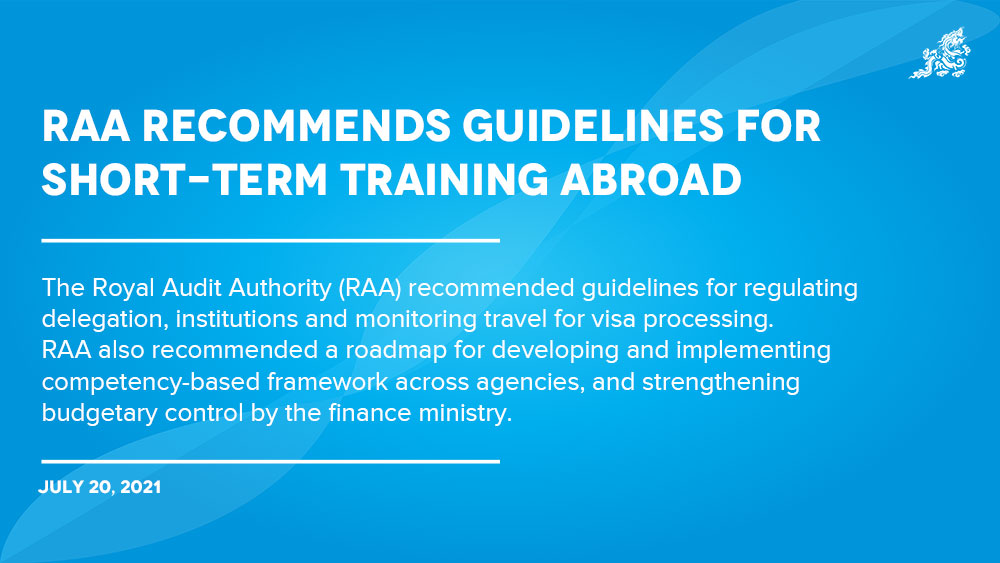Thinley Namgay
The Royal Audit Authority (RAA) recommended guidelines for regulating delegation, institutions and monitoring travel for visa processing.
RAA also recommended a roadmap for developing and implementing competency-based framework across agencies, and strengthening budgetary control by the finance ministry.
It made the recommendations for relevant agencies after finding out several lapses on ex-country travel for the short-term training (STT) between 2018 and 2019.
The Authority pointed out the lack of standard protocols for delegations and other types of ex-country travels and economic prudence.
“The training courses and institutes were approved based on the proposals of proponents. When offers are received, the agencies undertake ad-hoc and unplanned training,” the report said.
In over 106 instances, officials had availed training or had undertaken travel before the approval of the human resource committee (HRC). The approvals were accorded at a later date, as per the report.
RAA noted that 68 STT were availed without obtaining approval of the HRC.
The report says that agencies had not even complied with requirements to submit training or study tour reports and course completion certificates.
There were 303 such cases related to these requirements.
Based on expenditure, frequencies of travel and roles in the execution of ex-country travels, an audit was conducted for the 10 ministries, Gross National Happiness Commission, and National Environment Commission.
The report states: “The HRC merely formalises the nominations without assessing competency gap with respect to job responsibilities.”
The report also noted that training is often attended by officials from different position levels.
For instance, the training on local governance and development at Burapha University, Thailand from September 23 to 30, 2018, was attended by dzongrabs, gups, gewog administrative officers, internal auditor, administrative assistants, personal assistant, store assistant, and officials from the Department of Local Governance.
Nu 358.30 million (M) was spent during the 2018-2019 financial year for the STT abroad.
Of the Nu 358.30M, Nu 211.11M was spent for daily allowance, Nu 84.80M on air ticket, and Nu 62.39M for course fee and others.
Nu 82.82M was funded by the government and Nu 275.48M through other sources.
The Ministry of Agriculture and Forests spent 153.82M, followed by the Ministry of Finance and Ministry of Information and Communications with 28.39M and 27.56M respectively.
It was observed that from the total of 8,243 officials in 12 audited agencies, 2,823 had attended 4,242 STT in 81 countries between 2018 and 2019.
Report mentioned that over 70 officials from these agencies went abroad five to 14 times; more than 703 officials had availed two to four times, and more than 2,050 officials had travelled at least once.
Officials who availed the highest number of STT were from executive positions.
The report noted that 313 STT were found to be not related to the officials’ designations or job responsibilities. Officials travelled mostly to Thailand (1,244), India (819), and Nepal (519).
As per the report, officials did not follow the direct route and training could have been easily organised in the country.
The trips undertaken by the civil servants to the USA, Europe, and Canada between 2018-2019 showed that agencies had not adhered to the requirement to undertake travels through the most direct and economical route.
Edited by Jigme Wangchuk


